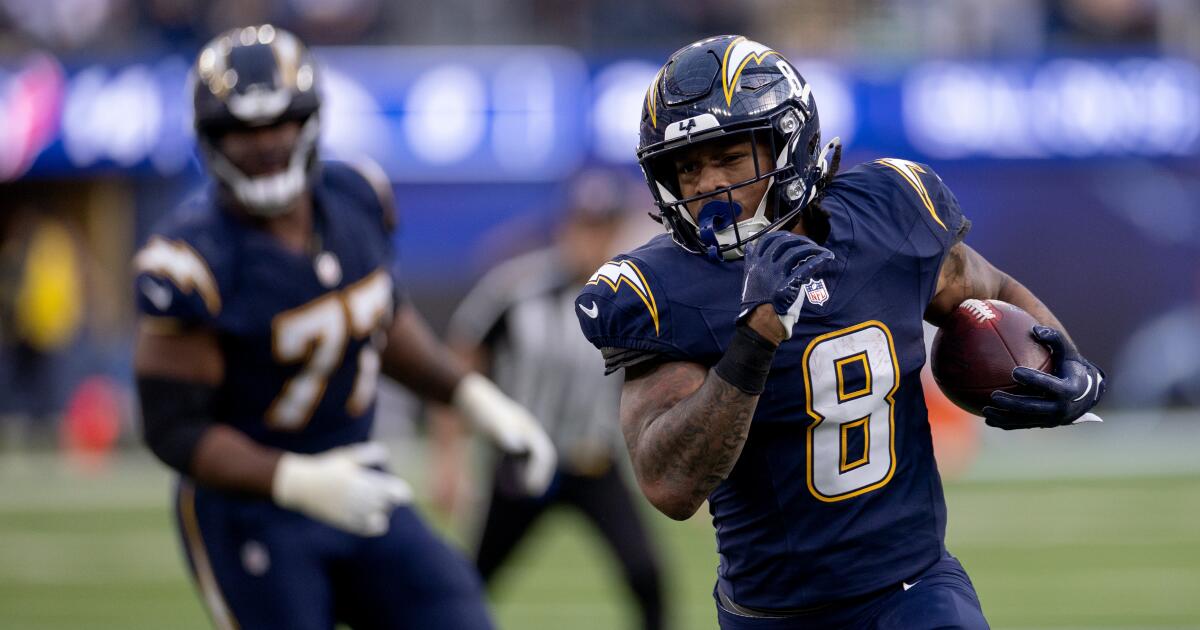Chargers know they can’t underestimate Drake Maye and Patriots
The Chargers’ mindset hasn’t wavered since Week 1.
Coach Jim Harbaugh and quarterback Justin Herbert insisted that it’s business as usual for the Chargers ahead of their AFC wild-card showdown against the New England Patriots at Gillette Stadium on Sunday night.
But rookie wide receiver Tre’ Harris can’t help but feel some change, even if just so slightly — knowing that a loss means back-to-back seasons under Harbaugh without a playoff win.
“Everybody a little bit more locked in,” Harris said. “Everybody’s staying a couple more hours after meetings and things like that. Cleaning up things, making sure everything’s dotted. That’s what comes with playoff football.”
Harris referenced a “wise words” speech linebacker Daiyan Henley made at the end of practice Thursday as an example of the communication veteran players and coaches are extending to younger players on the team.
Henley, who eclipsed 100 tackles for the second straight season, said his message was about not letting up — a reminder to adhere to the Chargers’ season-long standards and processes with their Super Bowl aspirations on the line.
“For me mentally, and for a lot of guys here, you get into these rooms with these coaches, and they can build up the moment, build up the anticipation,” he said. “It’s the playoffs. It’s do or die.”
The Crenshaw High alumnus continued: “These are things we all know. But what we have to understand is that it’s been do or die since we started this season, because if it wasn’t, we wouldn’t be here — we wouldn’t be in this situation in the playoffs.”
The importance of the game isn’t lost on Chargers offensive coordinator Greg Roman, who has been working longer in meetings — and waking up earlier too. Roman, who guided the Chargers to the 12th-best offense (334 yards per game) despite losing standout offensive linemen Rashawn Slater, Joe Alt and running back Najee Harris to injuries during the year, has been getting a head start on playoff preparations by setting his alarm for 2:30 a.m.
Luckily for the sleep-deprived Roman, he should have a healthy offensive line. Jamaree Salyer, who sat out the last two weeks with a hamstring injury, is set to return at left tackle, giving the Chargers their best starting five.
But one big question remains: will running back Omarion Hampton play?
After recovering from a fractured left ankle, the rookie tweaked his right ankle during Week 17 against the Houston Texans. Hampton, listed as questionable, said he’s planning to play against the Patriots. If Hampton can’t play or isn’t 100%, it could prove costly against a New England team that had the NFL’s sixth-best run defense (102 yards per game) during the regular season.
A standout performance by the Chargers’ defense would alleviate some of the pressure on offense. Under defensive coordinator Jesse Minter, the Chargers allowed the fifth-fewest yards (285 per game) and had the league’s ninth-ranked scoring defense.
In December 2024, the Chargers defeated quarterback Drake Maye and the Patriots 40-7 in Foxborough. Under coach Mike Vrabel, New England is a much different team — and Minter knows stopping Maye, a favorite for NFL MVP, will not be easy.
“Maybe the top offense in football,” said Minter, who has received requests to interview for head coaching jobs with the Cleveland Browns and Tennessee Titans.
But Minter is ready for the challenge, one that could add another highlight to his resume and send the Chargers into new territory under Harbaugh.
“I think everybody in our room has tremendous confidence,” Minter said.
